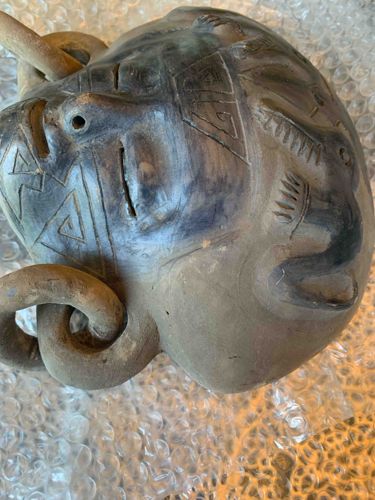
Pre-Columbian Style Anthropomorphic Clay Whistle/Ocarina
This item is a ceramic whistle or ocarina, likely of pre-Columbian or indigenous Mesoamerican style, crafted from unglazed, earthy toned clay. Its primary form appears to be a stylized head, possibly depicting a deity, animal, or mythical creature, with discernible facial features including a central circular nostril-like opening and two elongated, slit-like eyes. The surface of the head is intricately incised with geometric patterns, including triangles and zigzags, suggestive of traditional indigenous artistry. There are also smaller, more organic forms suggestive of limbs or appendages, possibly claws or paws, etched into the clay. The color palette of the clay ranges from a light tan or buff to darker, almost blackened areas, particularly on the prominent features and around the etched designs, indicating either a differential firing technique (such as reduced firing in specific areas) or the presence of a natural patina and residue over time. At the rear or side of the head, there are integrated, looped clay elements resembling chain links, suggesting the item may have been designed to be suspended or worn. The craftsmanship indicates hand-molding and carving. There are visible signs of age and wear consistent with a clay artifact, including surface abrasions and potential areas of material loss, though no major cracks or repairs are immediately apparent. The overall condition suggests it has been preserved reasonably well given its material and likely age. The unique design and functional aspect as a whistle or ocarina point towards its cultural and potential ritualistic significance.
AI-Generated Appraisal Disclaimer
Estimated Value
$40-$80
Basic Information
Category
Ceramics/Pottery
Appraised On
March 1, 2026
Estimated Value
$40-$80
Additional Details Provided By Owner
User Provided Information
Clay
Item Description
This item is a ceramic whistle or ocarina, likely of pre-Columbian or indigenous Mesoamerican style, crafted from unglazed, earthy toned clay. Its primary form appears to be a stylized head, possibly depicting a deity, animal, or mythical creature, with discernible facial features including a central circular nostril-like opening and two elongated, slit-like eyes. The surface of the head is intricately incised with geometric patterns, including triangles and zigzags, suggestive of traditional indigenous artistry. There are also smaller, more organic forms suggestive of limbs or appendages, possibly claws or paws, etched into the clay. The color palette of the clay ranges from a light tan or buff to darker, almost blackened areas, particularly on the prominent features and around the etched designs, indicating either a differential firing technique (such as reduced firing in specific areas) or the presence of a natural patina and residue over time. At the rear or side of the head, there are integrated, looped clay elements resembling chain links, suggesting the item may have been designed to be suspended or worn. The craftsmanship indicates hand-molding and carving. There are visible signs of age and wear consistent with a clay artifact, including surface abrasions and potential areas of material loss, though no major cracks or repairs are immediately apparent. The overall condition suggests it has been preserved reasonably well given its material and likely age. The unique design and functional aspect as a whistle or ocarina point towards its cultural and potential ritualistic significance.
Related Tags
Get Your Items Appraised
Instant estimates of your treasures with AI-powered instant appraisals